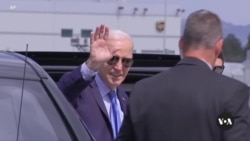Despite major donors reluctant to keep campaign funds flowing and more Democrats publicly saying that his chances of winning the November election are dwindling, President Joe Biden shows no public sign of stepping down.
"I look forward to getting back on the campaign trail next week," he said in a campaign statement.
Biden is "in this race and he's in it to win it," Dan Kanninen, Biden campaign battleground states director, said in a statement. "Moreover, he's the presumptive nominee — there is no plan for an alternative nominee."
"It is high past time we stop fighting one another," Kanninen said. "The only person who wins when we fight is Donald Trump."
Still, if Biden does step aside, Democrats must swiftly decide who would replace him on the top of their ticket, and how.
One scenario would be for Biden to endorse an alternative candidate and ask Democratic delegates to transfer their pledged votes when they assemble next month at the Democratic National Convention (DNC) in Chicago, Illinois.
Historically, convention delegates vote for the candidate who won the primary or caucus in their respective states. Almost all 3,896 Democratic delegates are pledged to Biden after he swept every contest in the country. But that “pledge” can be changed under DNC rules that allow for “good conscience” to determine delegate decisions.
“There may be some negotiation if Joe Biden were to decide to step aside to say, maybe we could at least encourage or endorse or try to set in place a way that Vice President [Kamala] Harris might be the nominee,” said John C. Fortier, fellow focusing on elections at the American Enterprise Institute.
However, delegates are not required to do so, Fortier told VOA. “There's not an absolute guarantee or legal way for him to switch his support to her.”
Harris a logical choice
Still, Harris would be a logical choice to quickly coalesce delegate votes. She is already first in the line of presidential succession. Nominating a Black woman could also help secure African American votes, a core bloc of the Democratic Party’s support.
Publicly, she remains loyal. “Joe Biden is our nominee,” she said earlier this month. “We beat Trump once and we're going to beat him again. Period.”
As part of the Biden-Harris ticket, Harris would make sense financially. Under campaign finance rules, Harris is entitled to spend the Biden-Harris war chest, which stands at $91 million, according to their last filing report in June.
Fifty-eight percent of Democrats think Harris would make a good president, according to a new poll from the AP-NORC Center for Public Affairs Research, and about 30% percent of the public overall think she would. Forty-three percent of adults have a favorable opinion of her, including 74% of Democrats.
However, Democrats might also want to avoid the undemocratic appearance of an automatic coronation of Harris as Biden’s successor, especially if others come out to contest the nomination.
“The goal of the party will be to have some sort of process before the convention and at the convention that allows whoever gets into the race to court the delegates,” said Elaine Kamarck, senior fellow in governance studies at the Brookings public policy organization and author of a book on how America nominates presidential candidates.
That process “could be any number of things,” she told VOA. “It could be regional meetings. It could be a debate.”
The bottom line is, should the president step aside, Democrats must quickly figure out who replaces him and who is likely to win the election, said Larry Sabato, director of the University of Virginia’s Center for Politics.
“And that ought to be the same person,” he told VOA. “Whether they can do it in the time permitted — it’s a month — is another question entirely.”
Open convention possible
Next month’s DNC could be an open convention, where the delegates nominate someone other than Biden. It would be a contested convention if there’s more than one candidate vying for the slot.
A contested convention could be tumultuous and divisive, something Democrats would want to avoid two months before the election.
“At this point, we don't have a contested convention. We might have an open one, but we don't have a contested one,” Kamarck said. “There's no time, all right. It's a month, literally, from now to the convention. Nobody is calling delegates.”
If there is a contest, floated names include California Governor Gavin Newsom, Pennsylvania Governor Josh Shapiro and Michigan Governor Gretchen Whitmer.
At the convention, Democrats must also decide who will be at the bottom of the ticket, another process that could create both excitement and division.
“Whoever is the loudest in critiquing Harris' choice will probably be the sort of faction of the party that gets their nominee into the V.P. slot,” said Jennifer Mercieca, professor of political communication at Texas A&M University.
Ahead of the November elections, that’s a lot of turmoil for Democrats.
“It's all speculation at this point,” Mercieca told VOA. “We have no idea; we've not seen anything like this before.”
At separate occasions, Biden has said that the direst of polling results could get him to quit, or if there is a “medical condition that emerged,” or if the “Lord Almighty comes out and tells” him to.
The president remains in isolation in his vacation home in Delaware, following his COVID diagnosis this week.






























